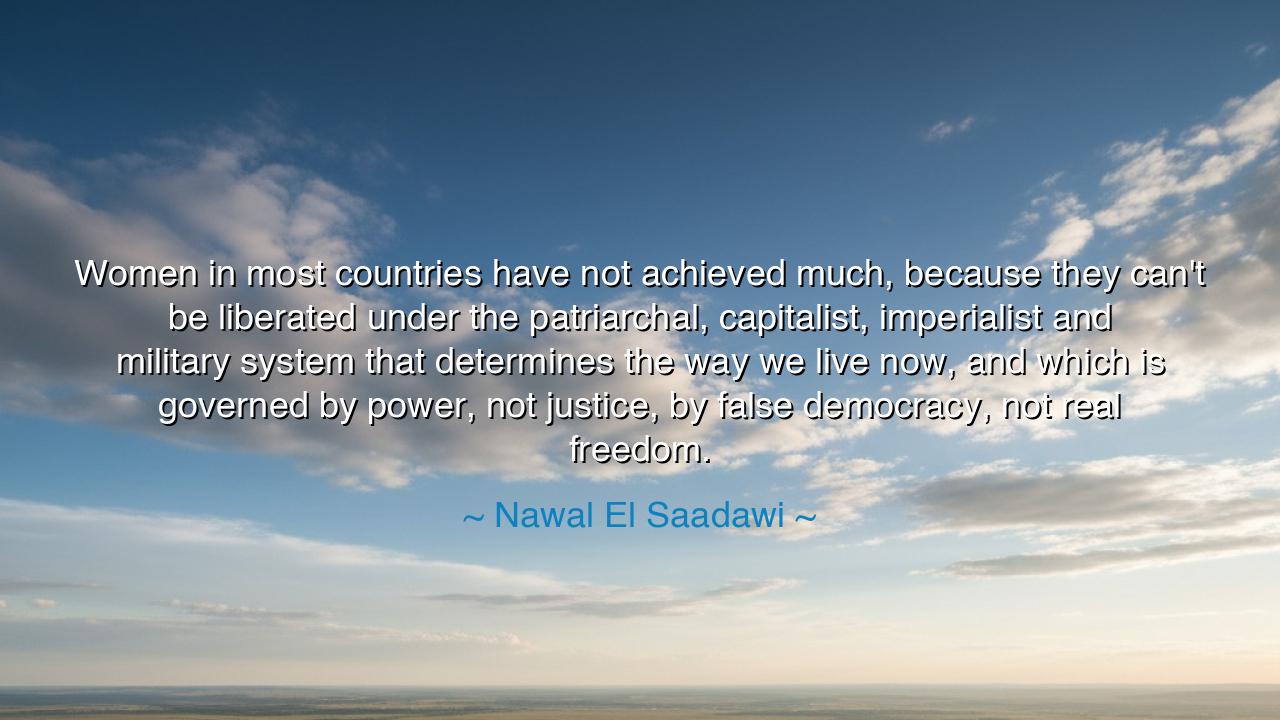
Women in most countries have not achieved much, because they
Women in most countries have not achieved much, because they can't be liberated under the patriarchal, capitalist, imperialist and military system that determines the way we live now, and which is governed by power, not justice, by false democracy, not real freedom.






Host: The room was quiet, the soft glow of the lamp casting a warm, intimate light across the space. Outside, the world had settled into the stillness of the evening, and the only sound was the peaceful rhythm of the night. Jeeny sat at the table, her fingers lightly tracing the rim of her cup, absorbed in thought. Jack, standing near the window, gazed out at the darkened world, his posture relaxed, but clearly reflecting on something deeper. There was a sense of calm between them, yet the weight of their conversation was about to take on a more profound tone.
Jeeny: (breaking the silence, her voice calm but filled with resolve) “I came across something by Nawal El Saadawi today that really made me think. She said, ‘Women in most countries have not achieved much, because they can’t be liberated under the patriarchal, capitalist, imperialist and military system that determines the way we live now, and which is governed by power, not justice, by false democracy, not real freedom.’ What do you think about that?”
Jack: (pauses, his voice thoughtful) “It’s a strong statement, isn’t it? El Saadawi is calling out the interconnected systems—patriarchy, capitalism, imperialism, and militarism—that hold women back from true liberation. She’s highlighting that these systems are so deeply ingrained in how society functions that even the concept of freedom and democracy is often distorted, especially for women. It’s not about a lack of effort or capability on women’s part—it’s about the systems that have systematically oppressed them, that restrict true equality and justice.”
Jeeny: (nodding slowly) “Exactly. It’s a stark reminder that freedom isn’t just about individual empowerment or access—it’s about dismantling the structures of power that maintain inequality. For women, especially in many countries, true liberation can’t happen until the systems that perpetuate oppression are addressed. The idea of democracy and freedom can be a myth if it’s not built on a foundation of true equality and justice.”
Host: The stillness in the room deepened as their words settled, and Jack turned slightly toward Jeeny, his expression softening as he considered the broader implications of El Saadawi’s quote. Outside, the world had quieted, but inside, their conversation had shifted toward a more reflective place, exploring how deeply rooted systems of power shape the possibilities for liberation.
Jack: (his voice quieter now, more reflective) “I think what strikes me is how she points out that these systems aren’t just external forces—they shape our very perception of what freedom and democracy are supposed to look like. We often think of these terms as universal, but for many women, the way those systems are structured makes it impossible to experience them. Power, not justice, defines the way society is organized, and that’s where the problem lies.”
Jeeny: (softly) “Yes, it’s about the illusion of freedom. We think of democracy as a given, something that’s already been achieved, but for so many people, especially women, it’s a distorted version of it. Democracy doesn’t mean anything if the systems of power continue to exclude, exploit, and marginalize large parts of the population. True freedom can’t exist in a world built on inequality.”
Jack: (nodding slowly) “Exactly. El Saadawi is asking us to think about what real freedom means. It’s not just about having the freedom to vote or express opinions—it’s about having the freedom to live without the structures of patriarchy and capitalism holding you back. It’s about justice that doesn’t just sound good on paper but exists in every aspect of life, from the workplace to the home.”
Jeeny: (gently) “Yes. And liberation is a process, not just a moment of victory. It’s about dismantling the systems that have kept women—and so many others—oppressed for generations. The real work lies in changing the very fabric of society, where power is distributed in a way that elevates justice, equality, and freedom for all people.”
Host: The quiet between them felt heavier now, the weight of their words settling in. Outside, the world had quieted, but inside, there was a shared understanding of how deeply ingrained systems of power must be confronted in order to bring about true liberation. Jeeny and Jack had uncovered a truth about justice and freedom—that they can’t exist as mere concepts if the systems that perpetuate inequality remain intact. True change requires dismantling those systems and redefining what freedom and democracy mean for everyone.
Jack: (smiling softly, his voice more assured) “It’s a reminder that change isn’t just about individual effort—it’s about collective action and addressing the systems that maintain inequality. The work is bigger than any one person—it’s about reshaping society itself.”
Jeeny: (nodding warmly) “Exactly. And when we understand that, we can begin to work towards a world where real freedom and justice exist for everyone, not just for the privileged few.”
Host: The night outside had deepened into quiet, but inside, the room was filled with understanding. Jeeny and Jack had uncovered the deep truth in El Saadawi’s words—that true liberation for women, and for all marginalized people, cannot happen until we confront and dismantle the systems of power that create and perpetuate injustice. True democracy and freedom can only exist when equality and justice are built into the very foundation of society.






AAdministratorAdministrator
Welcome, honored guests. Please leave a comment, we will respond soon